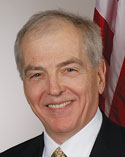When the National Labor Relations Board is at full strength, it has five members. Now it’s down to just two. With Senate Democrats blocking White House appointments, those open slots won’t be filled soon. One result, says David Parker, NLRB deputy executive secretary, is that “a two-member board will not issue major cases.” The delay will affect several construction cases.
NLRB departures began on Dec. 16, when Chairman Robert J. Battista’s term expired. Members Peter N. Kirsanow (R) and Dennis P. Walsh (D) were serving since early 2006 on recess appointments, but those expired Dec. 31. Remaining members are Democrat Wilma B. Liebman and Republican Peter C. Schaumber.
 | One Republican member and one Democratic member remain on the National Labor Relations Board. NLRB is unlikely to issue decisions in key pending cases, some construction-related. They include “lead cases” dealing with bannering: Eliason & Knuth, assigned in July 2004, and Starkey Construction, assigned in May 2006. |
 | |
It looks like NLRB will stay short-handed for a while. Democrats have stymied new recess appointments to it and other agencies, avoiding a Senate recess by holding pro forma sessions. Bush also nominated Kirsanow and Walsh to fill out full terms, but Democrats almost certainly won’t confirm Kirsanow because unions are incensed at recent rulings. Republicans surely won’t accept Walsh unless a GOP nominee is approved, too.
Maurice Baskin, Associated Builders and Contractors’ general counsel, says, “It’s unfortunate that the Democrats in Congress are playing games with important agencies like the NLRB. Keeping them from having a full quorum prevents them from issuing decisions that benefit employees, employers and unions.”
Michael Bearse, Laborers International Union of North America general counsel, says, “Obviously it’s not a good thing when a major agency is not able to conduct its business.” But he adds, “Given the antiunion tenor of this raft of decisions that’s been coming out of the board, I think our view is no decisions [are] better than the decisions they’ve been issuing.”
Pending construction cases include Eliason & Knuth, assigned to the board in 2004, and Starkey Construction (2006), which deal with “bannering,” in which unions wave protest banners outside the office of a construction firm’s customer.
Denise S. Gold, Associated General Contractors’ associate general counsel for labor and employment law, says NLRB’s situation “will likely delay rulings on cases involving significantly controversial issues, but that can happen even with a full board. It seems to me to be a manifestation of the broader tension between politics and policy in government today, but I don’t expect it to have a substantial impact on construction employers.”

Post a comment to this article
Report Abusive Comment